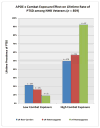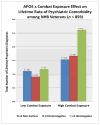EFFECT OF THE APOE ε4 ALLELE AND COMBAT EXPOSURE ON PTSD AMONG IRAQ/AFGHANISTAN-ERA VETERANS
- PMID: 25709077
- PMCID: PMC4697754
- DOI: 10.1002/da.22348
EFFECT OF THE APOE ε4 ALLELE AND COMBAT EXPOSURE ON PTSD AMONG IRAQ/AFGHANISTAN-ERA VETERANS
Abstract
Background: The apolipoprotein E (APOE) ε4 allele has been implicated in a range of neuropsychiatric conditions. The present research examined if the ε4 allele of the APOE gene moderated the effect of combat exposure on posttraumatic stress disorder (PTSD) among Iraq/Afghanistan-era veterans.
Method: Participants included 765 non-Hispanic White (NHW) and 859 non-Hispanic Black (NHB) Iraq/Afghanistan-era veterans. A structured interview established psychiatric diagnoses. Combat exposure and PTSD symptom severity were assessed via self-report.
Results: The most common lifetime diagnoses were depression (39.2%), PTSD (38.4%), and alcohol dependence (24.38%). After correcting for multiple comparisons, no significant effects were observed on any of the outcomes among the NHW sample; however, within the NHB sample, significant gene × environment (G × E) interactions were observed for lifetime PTSD (P = .0029) and PTSD symptom severity (P = .0009). In each case, the APOE ε4 allele had no effect on the outcomes when combat exposure was low; however, when combat exposure was high, an additive effect was observed such that ε4 homozygotes exposed to high levels of combat reported the highest rates of PTSD (92%) and the worst symptom severity scores on the Davidson Trauma Scale (M = 79.5).
Conclusions: Although preliminary, these findings suggest that the APOE ε4 allele, in conjunction with exposure to high levels of combat exposure, may increase veterans' risk for developing PTSD.
Keywords: APOE; PTSD; comorbidity; depression; genetic; veteran.
© 2015 Wiley Periodicals, Inc.
Conflict of interest statement
The authors have no conflicts of interest to declare.
Figures



References
-
- Hoge CW, Castro CA, Messer SC, et al. Combat duty in Iraq and Afghanistan, mental health care problems, and barriers to care. N Engl J Med. 2004;351:13–22. - PubMed
-
- Lapierre CB, Schwegler AF, Labauve BJ. Posttraumatic stress and depression symptoms in soldiers returning from combat operations in Iraq and Afghanistan. J Trauma Stress. 2007;20(6):933–943. - PubMed
Publication types
MeSH terms
Substances
Grants and funding
LinkOut - more resources
Full Text Sources
Other Literature Sources
Medical
Research Materials
Miscellaneous

